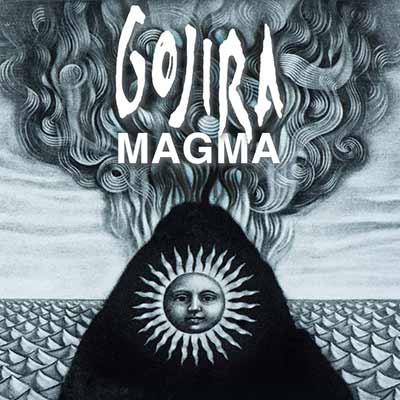It’s difficult to write about Gojira’s new record. It’s a carefully streamlined and polished gem of an album, one that messes with their established formula and makes it more accessible — without ever losing sight of their progressive metal roots. But saying all that, traditionally, might be enough to upset many diehard fans.
Most metal fans like it when bands have a unique sound and they don’t mess with it. There was outcry when Metallica went mainstream, and now they’re one of the most hated bands in rock history (for a variety of reasons). Every metal band that goes “mainstream” inevitably loses fans — often because it means losing the magic that made the band what it was.
But for Gojira, going mainstream doesn’t seem to change their core at all.
The story behind Magma is tragic: brothers Joe and Mario Duplantier suffered the loss of their mother early in the recording sessions for the album, and it dramatically shaped the songwriting and sounds of the rest of the record. It’s obvious from the opening notes of The Shooting Star that the band is trying to express grief with their somber music.
In The Cell, a brutally hardcore track, the band shouts “No control over anything… Get me out of here; I’m lost in the dark.” It sums up the record’s stages of grief exceedingly well: the band is wading through the loss of control and the haze of death, and looking for an escape.
In that sense, when they upend things by putting tracks in a seemingly odd order, and sacrificing some of the pacing of the record, we get the sense as listeners that the album wasn’t really made for us. It was made for the Duplantier brothers. We’re fortunate enough to be able to listen to it, though.
Almost every track on the record is worth talking about for some merits. The vocal performances are incredible: the band sings, and actually sounds excellent doing it, on many tracks. Again, it suits the somber tone of the record.
But then there are tracks like Stranded, where the band is in full-out experimental mode, with guitar solos that purposefully misdirect, a chorus that feels more hard rock than heavy metal, and a vocal performance that is as emotionally arresting as it is surprising. Despite the sound being more approachable, these songs are not radio-friendly singles.
Magma also has some of the shortest tracks of Gojira’s career. Yellow Stone comes in at one minute and nineteen seconds, with a brooding bass line that carries it through. It’s the dividing point on the record, one that spends a brief moment in silence (compared to the barrage that much of the rest of the album offers) and then moves on.
The biggest surprise, though, comes with the last track. Liberation is a wordless acoustic track (a first for Gojira in my memory) that exists as the denouement. It might be that the Duplantier brothers aren’t past their loss, but they’re trying to move on. They want to be liberated.
Magma is one of metal’s largest achievements this year. Listening to it gives me the same feeling I had the first few times I listened to Mastodon’s Crack the Skye. It’s an album that’s ostensibly not for fans. It’s not meant to be an experiment, but because of its extraordinary self-indulgence, it comes off as one. But it’s also an immense delight. Magma is the rare metal album that I’d suggest to nearly anybody.
